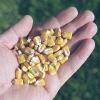06
Oct
European Farmers Defend Their Right To Produce GMO-Free Food
(Beyond Pesticides, October 6, 2010) Organic and genetically modified organism (GMO)-free conventional farmers and food processors need legal certainty that they can continue to produce food free of GMO contamination. This, according to the International Federation of Organic Agriculture Movements (IFOAM)— EU Regional Group, which responded to a presentation by EU Commissioner for Health and Consumer Protection John Dalli on “best practice document” for genetically modified (GM) maize. The best practice document outlines voluntary guidelines for the coexistence of genetically modified crops with conventional and organic farming, but fails to address the economic and social impacts on contaminated non-GMO farms.
Commissioner Dalli presented to the Farm Council proposals on GMO cultivation, as well as a new “best practice document” for maize. “Commissioner Dalli is trying to snake his way through crucial GMO policies by attempting to satisfy all conflicting parties with his proposals to the Farm Council this morning. But his approach still fails to solve the main problems,” comments Christopher Stopes, President of the IFOAM EU Group. “Consumers refuse to eat GMOs which is their democratic right.”
The best practice document authored by the European Coexistence Bureau, developed in light of a July 2010 recommendation, reflects the possibility for EU member states to establish coexistence measures to avoid the unintended presence of GMOs in conventional and organic crops. Best practices as outlined in the document include isolation distances, buffer zones and the use of dedicated machinery or storage places. However, economic and social damage from the potential impacts of a new GMO on the GMO-free food and feed sector were not fully considered and explored.
“The European Coexistence Bureau did an extensive job with its maize best practice document, but we are disappointed by the fact that our concerns about the legal requirement to avoid all contamination in the harvest and about the real costs of machinery cleaning were not sufficiently considered,” adds Antje Kölling, Policy Coordinator IFOAM EU Group. “If the Commission speaks about coexistence, it must ensure the maintenance of GMO-free food and farming, not give way to commingling up to tolerance thresholds and increasing contamination.”
According to IFOAM, farmers want to meet the demand for GMO-free food, but they are facing increasing obstacles and costs to do so. Farmers need legal certainty, not only voluntary guidelines, to be able to stay in business. IFOAM calls on EU farm ministers to defend the right of farmers to produce GMO-free food and to push for this legal certainty.
“Organic farmers in Spain gave up growing maize because of the high contamination risks and the fact that contamination with GMO maize has already happened. Many farmers face enormous costs as they have to import GMO-free and organic maize from abroad to feed their animals according to the organic rules and market demand,” adds Victor Gonzálvez of Sociedad Española de Agricultura Ecológica (SEAE) Spain. “EU-wide compulsory measures to prevent contamination as well as full liability of those who place GMO on the market for costs that non-GMO growers and processors face are long overdue.”
Recently, a study by University of Notre Dame ecologist Jennifer Tank, PhD and colleagues found that streams throughout the Midwest are contaminated with GM materials from corn crop byproducts, even six months after harvest. GM crops are already known to contaminate conventional non-GM and organic crops through “genetic drift” and take a toll on the environment by increasing resistant insects and weeds, contaminating water and affecting pollinators and other non-target organisms. The long-term health effects of consuming GM food are still unknown. GM crops present a unique risk to organic growers. Wind-pollinated and bee-pollinated crops, such as corn and alfalfa, have higher risks of cross pollination between GM crops and unmodified varieties. Currently, no provision exists to effectively protect organic farms from contamination, although EPA has required “refuges” or non-GM planted barriers around sites planted with GM crops. However, a 2009 study shows that one out of every four farmers who plants GM corn is failing to comply with at least one important insect-resistance management requirement.
In the U.S. GMO crops, whether by the incorporation into food crops of genes from a natural bacterium (Bt) or the development of a herbicide-resistant crop, the GM approach to agricultural pest management is short sighted and dangerous. There are serious public health and pest resistance problems associated with GM crops. Beyond Pesticides’ goal is to push for labeling as a means of identifying products that contain GM ingredients, seek to educate on the public health and environmental consequences of this technology and generate support for sound ecological-based management systems.
For more information on GM crops please see Beyond Pesticides page on Genetic Engineering.
Source: International Federation of Organic Agriculture Movements (IFOAM)— EU Regional Group Press Release










